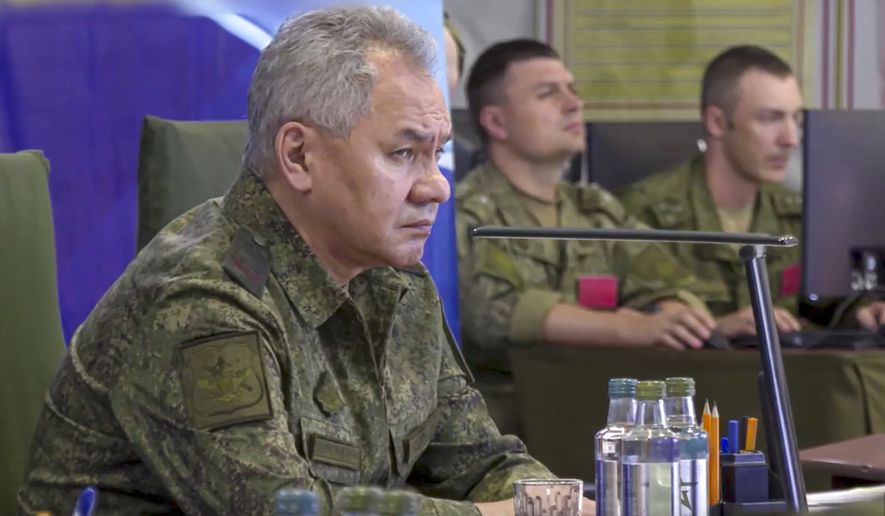Russia’s defense minister told his generals that knocking out Ukraine’s long-range missiles supplied by the U.S. and other NATO allies should be their priority, indicating that Moscow believes weapons, such as the American-made M142 High Mobility Artillery Rocket System, are playing a critical role on the battlefield.
During a recent inspection, Defense Minister Sergei Shoigu told the commander of Russia’s Vostok battlegroup to use “surgical strikes and crush the enemy’s long-range missile and artillery means,” according to Russia’s state-owned TASS news agency.
Russia is accusing Kyiv of using long-range missiles like the U.S.-made HIMARS to shell residential areas and grain storage facilities along with setting wheat fields ablaze in areas now under Moscow’s control. But Ukraine says they’re using the precision-guided rockets against military targets, such as the July 11 mission that destroyed a Russian ammunition depot in the occupied southern city of Nova Kakhovka, and that it is Russia that is indiscriminately shelling civilian targets.
The Kyiv Post newspaper said at least 200 Russian artillery rockets, along with fuel tanker trucks and dozens of other military vehicles, were at the ammo depot when the missiles struck July 11. There were at least 52 Russian casualties, according to media reports.
“Fires were still burning and secondary explosions were still taking place six hours after the strike,” the Kyiv Post reported.
Ukrainian Defense Minister Oleksii Reznikov told The Wall Street Journal last week that the HIMARS missiles have given Ukraine the capacity to fire deep into territory controlled by the Russian Federation troops and strike at two weak points — command and control facilities and logistics hubs. Analysts say Ukraine has put the eight U.S.-provided HIMARS to good use against those kinds of high-value targets.
SEE ALSO: Despite bravado, Russia seen ‘weakened’ by costs of Ukraine campaign
John Hardie, a senior research analyst with the Foundation for Defense of Democracies, said Mr. Shoigu’s order is just one indication that HIMARS is having a “significant impact” on the battlefield.
“A key question is how successful the Russians will be in adapting and mitigating the effect of HIMARS,” Mr. Hardie said Monday. “There are some structural factors in the Russian military that may make that difficult.”
Mr. Hardie said it was too early to confirm reports that the long-range missile strikes are slowing down Russia’s offensive in the Donbas region. The Pentagon believes the Western missiles are having a significant, although indirect, impact on front-line operations in Ukraine.
“They’re spending a lot of time striking targets like ammunition, supplies, other logistical supplies, command and control, and all those things have a direct impact on the ability to conduct operations on the front line,” a senior Defense Department official told reporters. “Although they’re not shooting the HIMARS at the front lines, they’re having a very, very significant effect on that.”
Russia is reinforcing defensive positions across the southern sections of Ukraine even as Kyiv has been applying pressure on Moscow’s lines in the Kherson area for more than a month. Ukrainian officials have recently alluded to future military operations to force Russia out of the areas it currently controls.
“Russian defensive moves are likely a response to anticipated Ukrainian offensives, to demands made by Defense Minister Shoigu on a recent visit to the Donbas, and also to the attacks Ukraine is launching against command posts, logistic nodes, and troop concentrations,” British military intelligence officials said Monday in a Twitter message.
The Pentagon, meanwhile, is getting bipartisan pressure on Capitol Hill to speed up new military shipments to Ukraine. Sen. Dan Sullivan, Alaska Republican, and Sen. Tammy Duckworth, Illinois Democrat, were among six senators who signed a letter Monday urging Defense Secretary Lloyd Austin and Joint Chiefs of Staff Chair Gen. Mark Milley to expedite already approved military aid for Kyiv. A $20 billion aid package approved in May included air-defense systems, powerful howitzers, more HIMARS, armored personnel carriers, drones and Mi-17 helicopters.
• Mike Glenn can be reached at mglenn@washingtontimes.com.




Please read our comment policy before commenting.